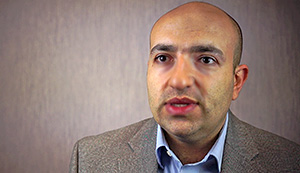HCRN study tests mFOLFIRINOX combined with ramucirumab in advanced pancreatic cancer

Researchers investigating many types of cancers have celebrated significant breakthroughs over the years. Yet, some cancers lag well behind these successes.
Pancreatic cancer remains one of the most difficult to treat cancers. In 2016, about 53,000 new pancreatic cancer cases were diagnosed in the United States, and nearly 42,000 people died of their disease. Despite these statistics, there are glimmers of hope on the horizon.
Recent studies have shown that certain combination therapies can lead to improved outcomes over single agent therapy in pancreatic cancer. For example, a study of FOLFIRINOX (a combination of the drugs fluorouracil (5-FU), irinotecan, oxaliplatin, and leucovorin) was shown to improve one-year survival compared to gemcitabine alone.
As immunotherapies have gained prominence, pancreatic cancer researchers are now looking to take combination therapies to a new level.
“This is new hope, a new era,” said Walid Shaib, MD, of the Winship Cancer Institute at Emory University. Dr. Shaib is the sponsor-investigator of a new Hoosier Cancer Research Network multi-center study that is examining an investigational combination of drugs for patients with advanced pancreatic cancer.
The randomized phase II study, known as HCRN GI14-198, involves mFOLFIRINOX combined with ramucirumab, versus mFOLFIRINOX combined with a placebo. Ramucirumab, also known as CYRAMZA®, is a monoclonal antibody that inhibits vascular endothelial growth factor receptor 2 (VEGFR2).
“In our trial, we hope to add more effectiveness to the medications that we are already using,” Dr. Shaib said. “Ramucirumab is a drug that is designed to inhibit the formation of new blood vessels that the cancer feeds on. We hope that the result will be killing more cancer cells, so that the cancer will not grow.
“There is another hypothesis that the drug itself can normalize blood vessels that the cancer feeds on,” Dr. Shaib continued. “If it normalizes the blood vessels, then the chemotherapy that we give is able to reach the cancer more easily.”
The HCRN GI14-198 study is now open to accrual at:
- Community Health Network, Inc. Cancer Centers in Indianapolis
- Gettysburg Cancer Center in Gettysburg, Pa.
- Indiana University Melvin and Bren Simon Cancer Center in Indianapolis
- Mayo Clinic, Phoenix
- Nebraska Methodist Hospital in Omaha
- Thomas Jefferson University/Sidney Kimmel Cancer Center in Philadelphia
- University of Louisville/James Graham Brown Cancer Center in Louisville, Ky.
- Winship Cancer Institute of Emory University in Atlanta
Joining Dr. Shaib in leading the study are principal investigator Tanios Bekaii-Saab, MD, of Mayo Clinic Cancer Center in Phoenix, and Emory University co-investigators Astrid Belalcazar, MD; Olatunji Alese, MD; Natalyn Hawk, MD; and Bassel El-Rayes, MD.
Up to 95 subjects will participate in the study. Subjects will be randomized 1:1 to one of two treatment arms. Arm A will receive the experimental treatment, mFOLFIRINOX, plus ramucirumab. Arm B will receive mFOLFIRINOX plus a placebo that looks identical to the ramucirumab but has no effect. Neither patients nor their care providers or study investigators will know which arm patients are assigned to. This is called double-blinding.
To enroll in HCRN GI14-198, subjects must have advanced pancreatic cancer that has spread to other parts of the body or has returned after treatment at least six months earlier. Additional eligibility requirements must be met to enroll.
The trial is supported by Eli Lilly and Company.
For more information about this study, including full eligibility requirements, visit www.clinicaltrials.gov (study identifier: NCT02581215).
CYRAMZA® is a trademark owned by or licensed to Eli Lilly and Company, its subsidiaries, or affiliates.
About Hoosier Cancer Research Network:
Hoosier Cancer Research Network (formerly known as Hoosier Oncology Group) conducts innovative cancer research in collaboration with academic and community physicians and scientists across the United States. The organization provides comprehensive clinical trial management and support, from conception through publication. Created in 1984 as a program of the Walther Cancer Institute, Hoosier Cancer Research Network became an independent nonprofit clinical research organization in 2007. Since its founding, Hoosier Cancer Research Network has initiated more than 160 trials in a variety of cancer types and supportive care, resulting in more than 350 publications. More than 5,000 subjects have participated in Hoosier Cancer Research Network clinical trials.

Facebook
Hoosier Cancer Research Network on Facebook
Linked In
You Tube
Twitter